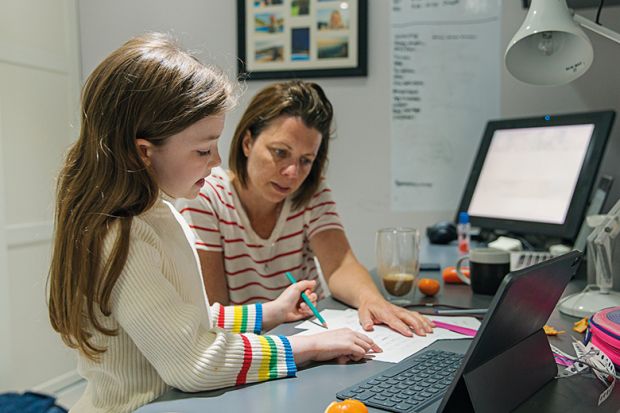Covid: working mums hit hard as v-cs demanded ‘business as usual’

Source: Getty
Universities’ attempts to maintain “business as usual” during the pandemic and their failure to reduce workloads have taken a massive toll on working mothers’ careers and mental health, according to an extensive survey.
The study of 2,888 mothers working in higher education, carried out by members of Durham University’s Mothers and Mothers-to-be Support Network and shared exclusively with Times Higher Education, is one of the most comprehensive assessments to date of the impact of the Covid-19 pandemic on women in higher education, revealing that UK institutions’ inconsistent and often ineffective responses to the crisis created additional pressures on parents.
Introducing “flexible” working hours while not reducing workload was cited as a huge burden on women, particularly as teaching was shifted rapidly online. Three-quarters – 73.9 per cent – of respondents agreed that their workload had increased during the pandemic, while only 17.5 per cent felt that their duties had been adequately adjusted to consider childcare responsibilities.
More than 80 per cent of respondents resorted to working in the evenings and on weekends to keep up while juggling childcare duties.
Asked to name the least helpful thing their institution did during the pandemic, “expectations of business as usual” was the most popular response. “At no point did the institution acknowledge that in a global pandemic it was simply unreasonable to expect parents to add in childcare and home-schooling to their normal full-time working schedule and stay sane,” one respondent wrote.
Other cited unhelpful responses included poor communication, uneven application of furlough, too many meetings and redundancies and hiring freezes. “These were all perceived as negatively impacting the time one had to accomplish work or look after children, or both,” the authors write.
While respondents strongly agreed that colleagues and line managers had been supportive of mothers’ need to combine work and childcare responsibilities, only four in 10 (39.6 per cent) felt that senior managers had been. One in three (32.7 per cent) felt that senior managers had not been supportive.
The survey confirms that women bore the brunt of additional childcare responsibilities during Covid-19, with 59.5 per cent saying they were responsible for the majority of or all “developmental” care such as homeschooling during the pandemic.
Combined with work pressures, this took its toll: 84.8 per cent said it had a negative impact on their mental health, with 66.8 per cent citing an impact on their physical health.
Nine out of 10 respondents (90.3 per cent) reported that they felt “exhausted a lot of the time during the Covid-19 restrictions”.
And the work that mothers were able to do suffered as well: 59.8 per cent said the quality of their work had declined, and 74.4 per cent said their output had shrunk.
Kris Kovarovic, one of the report’s authors and an associate professor in Durham’s department of anthropology, said many of the best and worst responses to the pandemic were “the two sides of the same coin”. When university leadership communicated carefully with staff, it was regarded as a big positive, but if they did not it was very harmful, she explained. Among the most-cited “most helpful” actions taken by universities were “teaching, marking or other workload relief”, individualised support and additional annual leave.
Nicole Westmarland, professor of criminology at Durham and another author, argued that university structures had “not kept up with the changes in attitudes” towards working mothers.
However, the differences between what some universities provided and what others did not was vast. “People really knew when the support was genuine and when the kindly words or offers of ‘wellness support’ were not backed up,” she said.
“The usefulness of the shiny buildings and the fancy coffee machines was wiped out overnight. None of that mattered, what mattered was…compassionate leadership and trust in your staff.”
Dame Athene Donald, master of Churchill College, Cambridge, said gender inequality would continue to be a “major problem” for the sector.
“Not only do we have women exhausted from having to work longer hours to cope with the additional demands during the pandemic, but any disadvantages that accrue in outputs – grants won, papers published and so on – will echo down the years on their CVs, adding to subsequent detriment,” she said.
“All institutions should be thinking hard about both short- and long-term impacts on women impacted in this way, and appropriately modifying requirements for recruitment and promotion to factor in the very real challenges this survey highlights.”



